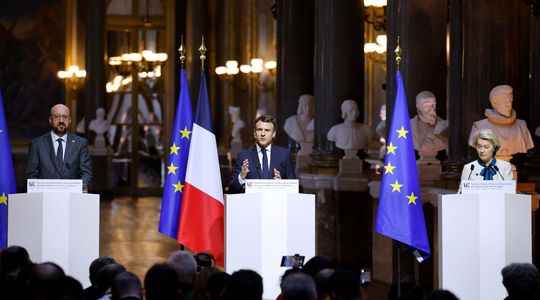“We are living in a European moment,” wrote Emmanuel Macron in January in his welcome speech on the website of the French presidency of the Council of the European Union. Today, an adviser praises without irony the “foresight” of the head of state about the priorities selected for the semester. When Paris thought the Versailles summit program, the high point of his rotating presidency, no one imagined that it would be held in time of war. Of course, on Thursday 10 and Friday 11 March, the Twenty-Seven devoted long hours to Ukraine. But defence, sovereignty or the reduction of the European Union’s dependencies were on the menu before the Russian invasion.
“If, a few years ago, some could see in European sovereignty a slogan or a French fantasy, everyone understands today that it is an imperative”, launched the President of the Republic in the gallery of the Battles of the castle. of the Sun King. The wind seems to have turned permanently. “The war has given weight to the ideas put forward by Macron, including on the reduction of dependence on Russia, hails a European source. 70% of what he proposes is taken up by the other leaders.”
The “Versailles Declaration” adopted on March 10 looks like a roadmap for this new, more resilient Europe. Defence, energy, food… the European Commission is responsible for making concrete proposals before new summits at the end of the month and next May. The Twenty-Seven also want to embark on the path of self-sufficiency in rare materials, semiconductors or digital technology. Areas largely overseen in Brussels by the French Thierry Breton. Behind the scenes, the Europeans are also discussing a pooling of the costs of the conflict in the military or energy fields.
“Fortunately France has the presidency”
Under the constraint of events, Europe therefore seems to be living its “French moment”. Especially since the coincidence of the calendar means that, for the first time in thirteen years, French ministers and diplomats have hosted the meetings which have been held at a frantic pace in Brussels since February 24. “Fortunately France has the presidency,” say European diplomats.
The teams’ months of intensive preparation proved even more valuable than expected. As a result, the files are completed extremely quickly. Thus, a week after the start of hostilities, the Ministers of the Interior were able to trigger an unprecedented temporary protection regime for Ukrainian refugees in the European Union, because the necessary technical work had been carried out at full speed.
As the dead pile up under Putin’s bombs, it is difficult to launch too vigorous croakings. The unity of Europeans is there, but it remains fragile. The differences of opinion remain, but are muted. “Events prove right those who advocated a geopolitical vision of Europe, but at what price?, laments Nicole Gnesotto, vice-president of the Jacques Delors Institute. I preferred a Europe asleep in a continent in peace to a powerful Europe in a continent at war.”
